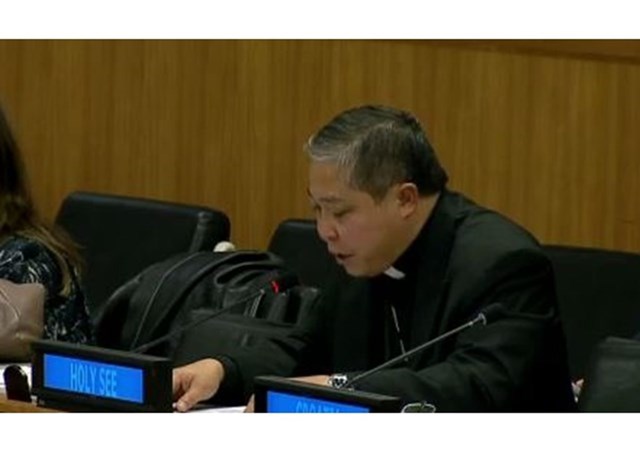
Arch. Auza addresses the UN on social development

(Vatican Radio) Despite much progress in eradicating poverty, accompanied by renewed economic growth, technological advancement and promising international accords, inequality in the world is still growing inequality with larger number of people going hungry and excluded. This is because economic growth does ensure social developmentnot focusing on the dignity of the human person and does not address the root causes of inequality and exclusion. Archbishop Bernardito Auza, the Holy See’s Apostolic Nuncio and Permanent Observer to the United Nations made the observation in New York on Monday.
Inclusive integral human development
Addressing a General Assembly meeting on social development, the Filipino archbishop called for a broader understanding of integral human development in order to ensure that the most vulnerable and marginalized are not excluded from the general achievement of progress. The international economy must be based on integral human development, or else, as Pope Francis has warned in the Encyclical “Laudato Si”, living beings will regarded as “mere objects subjected to arbitrary human domination, engendering “immense inequality, injustice and acts of violence against the majority of humanity…”
People first - the vulnerable
Instead, the global economy should seek to benefit everyone, both materially and spiritually. This includes a culture of encounter, of going out and working with the poor, meeting and speaking with the vulnerable in our society – in a word, it means putting people first.
Criticizing the current economic model, the Vatican nuncio said, it tends to emphasize success and self-reliance over community. Policies and investments are needed that empower the vulnerable, strengthen natural communities and help the marginalized avoid exclusion. We cannot reduce the needs of the marginalized to purely economic terms, he said.
Elderly, disabled, youth, migrants, refugees
In this regard, Arch. Auza singled out the elderly and disabled who, he said, face some of the gravest forms of discrimination and violence. Investment in safety nets like health-care, pension funds and family-based care are essential in reducing the vulnerabilities of the most disadvantaged.
According to the Vatican diplomat, social development also means dignified work for young people. He urged for policies that encourage apprenticeships and provide small loans and opportunities specially for young women and adolescent girls. He also called for respect for the human rights of migrants and refugees providing them basic services, including primary health-care and education for children.
| All the contents on this site are copyrighted ©. |


